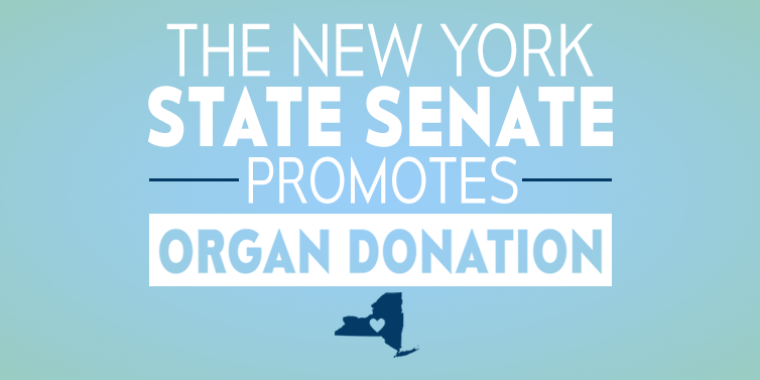
Senate Bills Encourage Organ Donation
Jeff Bishop, Communications Director
May 2, 2017
-
ISSUE:
- Organ and tissue donation

ALBANY, 05/03/17 -- State Senator James L. Seward (R/C/I/Ref – Oneonta) today announced senate passage of a comprehensive package of bipartisan bills aimed at encouraging more New Yorkers to become organ and tissue donors and protecting the rights of those who do. The bills focus on enhancing public awareness and removing bureaucratic obstacles and will increase the number of New Yorkers who sign up to help save lives through organ, tissue, bone marrow, and blood donation.
“The waiting list for organ and tissue transplants in New York is extraordinarily long,” said Senator Seward. “The senate has been a leader in drawing attention to this issue, passing legislation to enhance public awareness and increase the number of New Yorkers who sign up to help save lives through organ, tissue, bone marrow, and blood donation. We can do more, and these new bills are another lifesaving step forward.”
Only 27 percent of potential New Yorkers are enrolled in the New York State Donate Life Registry – the lowest rate in the country, whereas nearly 10,000 people are waiting for organ transplants in New York – the third highest rate in the country. The senate continues to advocate for increasing resources and public awareness on the importance of organ and tissue donation through legislation and funding. This year’s enacted state budget included $1.3 million as part of the senate’s ongoing commitment to help meet the need for lifesaving transplants.
Additional information on how to become an organ donor is available at www.donatelife.net.
The bills passed by the senate today include:
S.2496, the “Living Donor Protection Act of 2017” to prevent discrimination against living organ or tissue donors who have or are applying for life, accident, health, or long-term care insurance; designating transplantation preparation and recovery related to donation as “serious health conditions” covered by paid family leave; and directing the Commissioner of Health, in cooperation with the transplant council and other interested parties to develop and distribute information on live organ donation;
S.2497, establishing a one-time personal income tax credit for up to $10,000 for expenses related to a taxpayer donating his or her organs for transplantation. The bill also repeals the personal income tax modification, reducing federal adjusted income, for such expenses;
S.5283B, to further increase public awareness of organ and tissue donation, especially among youth. The bill would allow SUNY, CUNY, and library card applicants to register as organ donors under an expansion of Lauren’s Law, which changed DMV forms to require applicants to choose “yes” or “skip” the question about becoming a donor;
S.2162A to help medical transport teams quickly operate within their necessary and sensitive time frames. The bill would add human organ delivery vehicles to the list of authorized emergency vehicles in the state;
S.474B, would give the option to applicants for the practice of a profession or occupation, state income tax filers, and applicants registering motor vehicles to register in the Donate Life Registry for organ, eye, and tissue donations;
S.1475, would allow a taxpayer or the spouse of a taxpayer to deduct costs related to the taxpayer’s organ donation, and include child care costs within such allowable costs.
The bills will be sent to the assembly for consideration.
Additionally, S.2495, which passed both houses earlier this year, would allow the Transplant Council to expand its scope and help state organ donation efforts by making annual recommendations to the Commissioner of Health on organ donation, procurement organizations, and organ banks and storage, passed both houses earlier this year.
-30-
related legislation
Share this Article or Press Release
Newsroom
Go to NewsroomMichael L. Mayne
November 11, 2020

Statement on Remington Arms
October 26, 2020

State Highway Dedicated in Honor of Fallen Otsego County Marine
October 6, 2020

Statement on Remington Arms
October 1, 2020
